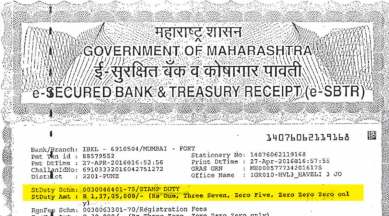Stay updated with the latest - Click here to follow us on Instagram
One plot, two rates: How Maharashtra Revenue Minister Eknath Khadse’s family undervalued 3-acre plot
Eknath Kadse land deal: The registration record shows the plot’s true market value at Rs 3.75 crore even as it records the minimum rate for the property as Rs 25,630 per sq m.

According to official records obtained by The Indian Express, Maharashtra Revenue Minister Eknath Khadse’s wife, Mandakini, and son-in-law, Girish Chaudhari, jointly purchased a three-acre land in Bhosari, near Pune, for Rs 3.75 crore on April 27 this year. But the same records show that they paid Rs 1.37 crore as stamp duty. This works out to close to the stamp duty for a transaction amount of Rs 31.01 crore, the market value of the plot.
The reason for the discrepancy: The purchase price declared by Khadse’s kin is substantially below the market value determined by the state government for the property.
monthly limit of free stories.
with an Express account.
Going by the sale deed, Khadse’s wife and son-in-law bought the property at Rs 1.25 crore per acre or Rs 3,088.81 per sq m.
[related-post]
The government’s annual statement of lands, which is used by the administration to determine the true market value, fixes the property rate at Rs 25,630 per sq m, which is over eight times more.
The Bombay Stamp (Determination of True Market Value of Property) Rules, 1995 clearly states that in case the market value as stated in the sale deed is less than the minimum value as prescribed by the annual statement of land, the registering authority must refer the matter to the district collector, who then has to pass an order adjudicating the true market value after recording statements of the parties involved.
But records show that Haveli Sub-Registrar Dinkar Lonkar registered the document without following this rule.
The registration record shows the plot’s true market value at Rs 3.75 crore even as it records the minimum rate for the property as Rs 25,630 per sq m.
The sub-registrar’s office functions under the revenue department, which Khadse himself heads.
Requesting anonymity, senior officials of the registration department admitted this was a serious lapse. “The sub-registrar ought to have referred the matter to the collector,” said an official. The Bombay Stamp Rules, 1995, also clearly state that misdeclaration or non-disclosure of relevant facts and circumstances while executing a deed is an offence that can be penalised.
Also, under normal circumstances, a stamp duty of six per cent is charged for open land in Maharashtra’s urban belt. This would mean that the stamp duty payable on market value was Rs 1.86 crore. But registration records do not explain the Rs 49 lakh difference in the amount of stamp duty payable and the actual amount paid.
Khadse, when contacted, defended that the stamp duty had been paid for the full market value of the plot, but was unwilling to discuss the reasons for undervaluing the property.
“This shows that black money was involved in the transaction. The Centre has promised action against those indulging in black money transactions. It must act in this case too,” said NCP spokesman Nawab Malik, who demanded a probe by income tax authorities in the case.
Khadse refused to respond to these allegations.
The Maharashtra Industries Development Corporation (MIDC), a state government undertaking, has objected to the transaction between Khadse’s kin and the original land owner, Abbas Ukani, on the ground that it had acquired the property in 1971 itself. Both Ukani and Khadse have contested this claim, arguing that the acquisition process, which was initiated in 1971, had not been completed, and the mandatory compensation had not been awarded.
The sale deed has some other inconsistencies too.
While the 7/12 extract — a basic revenue document of title that serves as evidence of ownership — and the record of rights show Ukani as the current sole owner of the plot, the sale deed includes Ukani and eight of his family members as the ‘vendor’ party.
Records show that the property was originally purchased by Ukani’s father, Rasulbhai, on June 29, 1966, but a mutation entry recorded by revenue authorities on March 3, 2010 recognises Ukani as the sole owner.
The Indian Express also examined a copy of the petition filed by Ukani in the Bombay High Court last September, where he claimed that he was the sole owner. However, according to the sale deed, the Rs 3.75 crore payment was divided among all nine members of the Ukani family. “Neither the sale deed nor the registration document describes the reason for his inconsistency,” said a senior official.
Moreover, the sale deed record shows that Khadse’s kin made an initial payment of Rs 50 lakh to Hasnain Zoeb Ukani, one of the owners, on March 11, even before the minister held a meeting to discuss compensation to the Ukani family.
[related-post]
While Ukani resides in Kolkata, The Indian Express visited his power of attorney holder Tehsin Khan’s residence in Pune. However, Khan was unavailable. A family member said she would ask him to contact this newspaper, but he did not do so.
The sale deed has also been registered without the recitals or the description of the property being a part of the document. “Normally deeds without recitals are not registered,” said a senior official.
The Indian Express was directed to speak to Deputy Inspector General of Registration, Nandkumar Katkar, about these inconsistencies, but he remained unavailable for comment despite multiple visits and phone calls to his office in Pune.
Pressuring the government to act against Khadse, the Congress on Wednesday wrote to Maharashtra Governor CH Vidyasagar Rao seeking Khadse’s ouster on the grounds that he had violated the “oath of secrecy” and “code of conduct” applicable to ministers.